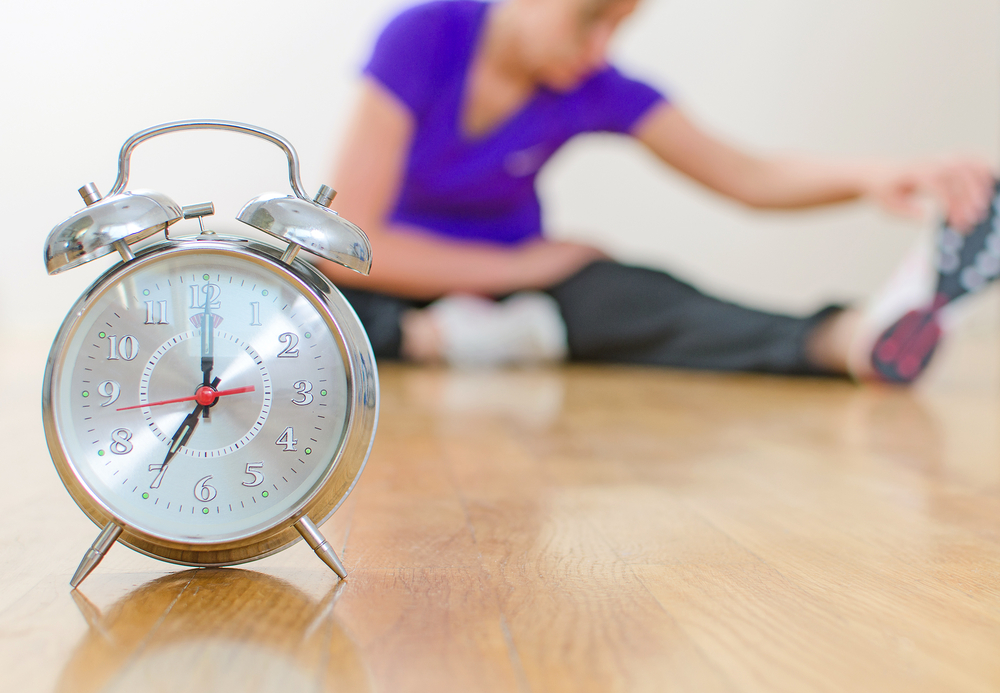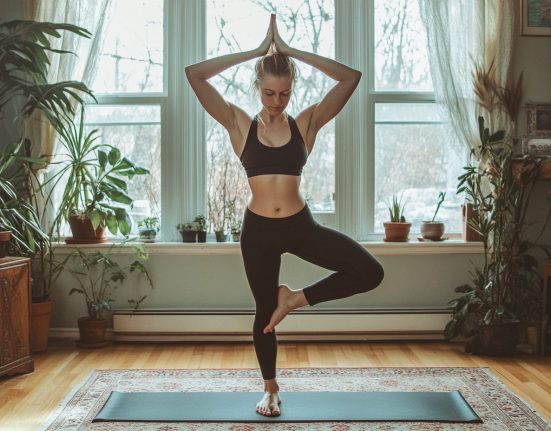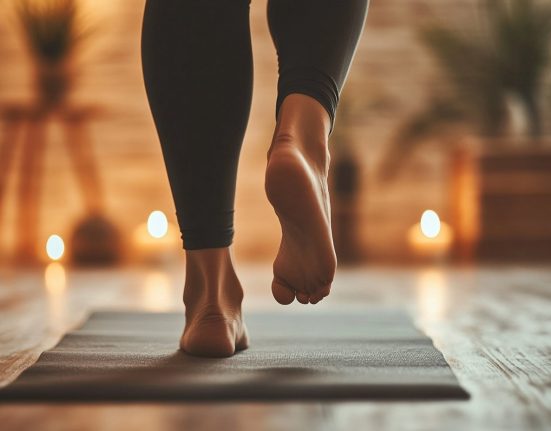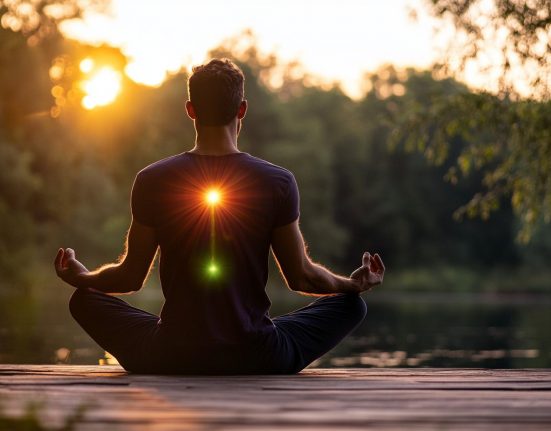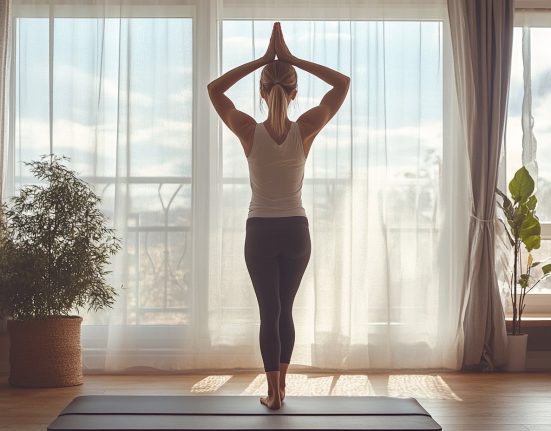Working out in the a.m. has its perks, sure. But there are benefits to being an evening sweater, too. Here’s a breakdown of the pros and cons.
In the fitness world, there’s no rivalry as contentious as the one between those who get after it at the crack of dawn, and those who watch the sunset while they sweat. But, do the early birds really get the worm gains? Or, do the night owls have it right?
To settle the score on a.m. vs. p.m. workouts once and for all, Jillian Michaels, fitness expert and creator of The Fitness App, and W. Chris Winter, M.D., neurologist and author of The Sleep Solution: Why Your Sleep is Broken and How to Fix It, share their wisdom. Below, they lay out the benefits of each before giving you the verdict (okay, okay their educated opinion) on whether it’s better to work out in the morning or exercise at night.
Benefits of Working Out In the Morning
You’ve likely heard of all the benefits of waking up before the sun. Well, if it’s for a morning workout, that list of perks is even longer.
1. It’s easier to be consistent with morning workouts.
How consistent you are with your fitness comes down to a combo of tenacity and time. But generally speaking, it’s easier to stay on track with a fitness regime first thing in the morning.
Think about it: A lot of things can pop up throughout your day that derail your evening workout plans, whether it’s errands, extra work, familial duties, or impromptu social plans. If your usual workout falls during happy hour, odds are you’ll choose a drink over your fitness more than once. Unless you’re tossing one back at 5 a.m. (yikes!) happy hour just isn’t going to fall at the same time as your sunrise sweat sesh. Working out in the morning means you’ll already have checked that off your to-do list for the day — and won’t need to worry about any conflicts or temptations getting in the way later.
2. Alcohol is less likely to interfere with morning workouts.
Speaking of alcohol, did you know booze can interfere with your fitness goals? When consumed right after a workout, alcohol makes it more difficult for your body to repair and recover from exercise, Paul Hokemeyer, Ph.D., an NYC-based addictions psychologist previously told Shape. And when you’re not adequately recovering from your workout, you’re not actually reaping all the possible benefits of that workout.
The good news for morning exercisers is that usually enough time has passed after your workout that an after-work cocktail won’t mess with your recovery or progress — or, at least as much as if you worked out at night and went right to happy hour or had a glass of wine.
3. Morning exercise may improve your focus for the rest of the day.
“Research suggests training at the beginning of your day can help improve your focus the rest of your day,” says Michaels. In a 2019 study published in the British Journal of Sports Medicine, participants who exercised in the morning reported better cognition throughout the day compared to those who didn’t exercise until after a whole day of sitting. A bout of moderate morning exercise led to increases in serum brain-derived neurotrophic growth factor (a molecule important for memory and learning), as well as working memory (temporary storage and use of information), according to the study.
4. Morning exercise may improve weight loss.
Obviously, there are so many benefits to exercise that have nothing to do with losing weight. But if weight loss is a goal for you, get this: “There have been some studies that show individuals who train before noon can lose more weight,” says Michaels.
One 2019 study published in the International Journal of Obesity, for example, found that when overweight, physically inactive adults worked out in the morning five days a week for 10 months, they saw greater weight loss compared to those who followed the exact same workout regime (!), but did their workouts at night.
“The mechanisms that cause this are not clear, but the theory is that it’s because morning exercisers set a positive tone of health for their day, and therefore eat better throughout the rest of their day,” she says. Makes sense!
5. Exercising in the morning is less likely to affect your sleep schedule.
Incorporating exercise into your routine at any time of the day will help you sleep — especially if you’ve otherwise been sedentary, says Dr. Winter. “When you exercise, you prime your body to create a chemical called benzene, which helps you sleep.”
But here’s the thing about working out at night: Cutting your workout too close to bedtime can interfere with your ability to fall asleep. That’s because working out can cause a surge of hormones (such as cortisol and adrenaline) that can leave you with a jolt of energy, explains Dr. Winter.
If your only option is to work out at night or before bed, “you have to counteract that chemical reaction to wind down in preparation for bed,” he says. (By doing a thorough cool down, meditating, or doing yoga, for example.) But if you exercise in the morning, you can simply enjoy that exercise high instead of having to find ways to counteract it in order to drift off faster, he says.
The Benefits of Working Out In the Evening
In the land of exercise, the morning warriors aren’t the only winners. Working out at night has benefits, too.
1. You might be more alert and energized in the evening.
Feel like you’re sleepwalking on the treadmill when you work out in the morning? It’s not all in your head. When you’re low on sleep, your physical performance, coordination, and endurance suffer, which can make early-morning exercise feel harder and also potentially lead to injury. And injuries, of course, will ultimately sideline you from being able to work out.
Not to mention, if you work out in the morning, you have that whole “should I eat before my workout?” conundrum to consider. (Spoiler: It’s okay if you don’t like to eat beforehand, but you might not perform at your best, since your body doesn’t have fuel at the ready to power your muscles.)
Meanwhile, if you work out at night, you’ll have had the whole day to fuel your body with food (and caffeine!) and build the level of alertness and energy you need to crush your workout.
2. You can burn off steam by working out at night.
“When I train in the evening, it helps me blow off some of the stress that has accumulated over the course [of the day],” says Michaels. This makes perfect sense given that exercise is a serious stress-reliever.
Having an outlet (might we suggest you consider boxing?) at the end of the day can provide a healthy outlet for releasing those daily stresses. And, if you work from home, it can also be helpful to have an activity like a workout to signal that you’re done with work for the day and mark a transition into your personal time.
3. Your evening workout might be better or longer.
“Research suggests you might have longer and stronger workouts later in the day than in the morning,” says Michaels. One study published in the Journal of Sports Science & Medicine, for example, found that people demonstrated better exercise performance in the early evenings. Why? Because their core body temp was already up after a day of *cue Rihanna* 🎵 work, work, work, work, work as opposed to in the morning, when the core body temperature is at the lowest it’ll be all day. (That said, the researchers note that getting your core body temp up — and then crushing it at the gym — is as simple as doing an active warm-up.)
4. You’ll likely have more sources of accountability for an evening workout.
It’s easier to find a friend who’s willing to meet you for a 5 p.m. workout versus a 5 a.m. class — and accountability is a key factor in sticking with your workout plans.
Plus, it’s less likely that you or your workout buddy is going to hit snooze on their alarm or accidentally sleep through a workout. (Hey, it happens to the best of us!)
So Which Is Better, Morning or Evening Workouts?
While the above may make you question your own habits, luckily the answer is pretty simple: “There is no right or wrong time to work out,” says Michaels. “Working out whenever your schedule allows is the best time to work out.”
That said, if you have the luxury of training at whatever time you want, she recommends a trial and error situation while “paying attention to how training at different times of the day makes you feel.”
As you do, Michaels suggests asking yourself:
- Are you amped up and ready to crush after that morning coffee? Or, do I find you have more energy in the evenings?
- Does training in the a.m. make you feel focused and empowered to take on the rest of your day? Or, does it make you feel tired for the rest of the day?
- Does your training time affect how well you sleep? When do you sleep better or worse?
The Best Time of Day to Work Out Is the Same Time
Once you find a time of day to work out that works best for you, stick to it, agree both Michaels and Dr. Winter.
“Training at the same time of day is ideal,” says Michaels. “It lends to building fitness into your routine, making it easier to establish working out as a healthy habit,” she says. Research in the journal, Obesity, backs this up.
If you train at the same time of day every day, your body is literally able to predict when it will have physical demands put on it, thereby shifting your biochemistry to give you more energy and strength at that particular time of day. If, for example, you always go on a run at the same time in the morning, Dr. Winter says after a few weeks you can expect your body to start naturally waking you up right before your morning run alarm would go off. Likewise, if you always work out after your 9-5 duties, your body will know to get a “second wind” right around when you shut your laptop each night. The body is pretty stinkin’ smart, right?



